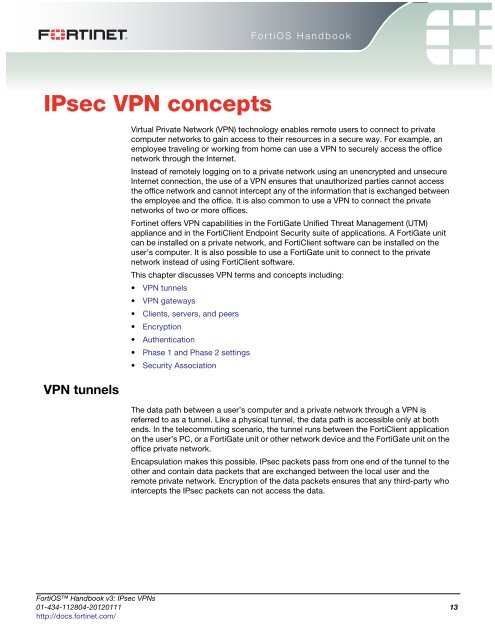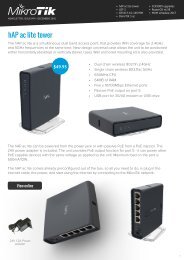- Page 1 and 2: IPsec VPNs FortiOS Handbook v3 for
- Page 3 and 4: Contents FortiOS Handbook Introduct
- Page 5 and 6: Contents Outbound and inbound NAT.
- Page 7 and 8: Contents Configure the FortiGate un
- Page 9 and 10: Contents Site-to-site IPv6 over IPv
- Page 11: Introduction How this guide is orga
- Page 15 and 16: IPsec VPN concepts VPN gateways Fig
- Page 17 and 18: IPsec VPN concepts Encryption Encry
- Page 19 and 20: IPsec VPN concepts Security Associa
- Page 21 and 22: IPsec VPN Overview Types of VPNs Ro
- Page 23 and 24: IPsec VPN Overview Planning your VP
- Page 25 and 26: FortiOS Handbook IPsec VPN in the w
- Page 27 and 28: IPsec VPN in the web-based manager
- Page 29 and 30: IPsec VPN in the web-based manager
- Page 31 and 32: IPsec VPN in the web-based manager
- Page 33 and 34: IPsec VPN in the web-based manager
- Page 35 and 36: IPsec VPN in the web-based manager
- Page 37 and 38: IPsec VPN in the web-based manager
- Page 39 and 40: FortiOS Handbook Auto Key phase 1 p
- Page 41 and 42: Auto Key phase 1 parameters Choosin
- Page 43 and 44: Auto Key phase 1 parameters Authent
- Page 45 and 46: Auto Key phase 1 parameters Authent
- Page 47 and 48: Auto Key phase 1 parameters Authent
- Page 49 and 50: Auto Key phase 1 parameters Definin
- Page 51 and 52: Auto Key phase 1 parameters Definin
- Page 53 and 54: Auto Key phase 1 parameters Definin
- Page 55 and 56: Auto Key phase 1 parameters Using X
- Page 57 and 58: Phase 2 parameters Basic phase 2 se
- Page 59 and 60: Phase 2 parameters Advanced phase 2
- Page 61 and 62: Phase 2 parameters Configure the ph
- Page 63 and 64:
FortiOS Handbook Defining VPN secur
- Page 65 and 66:
Defining VPN security policies Defi
- Page 67 and 68:
Defining VPN security policies Defi
- Page 69 and 70:
FortiOS Handbook Gateway-to-gateway
- Page 71 and 72:
Gateway-to-gateway configurations G
- Page 73 and 74:
Gateway-to-gateway configurations C
- Page 75 and 76:
Gateway-to-gateway configurations C
- Page 77 and 78:
Gateway-to-gateway configurations H
- Page 79 and 80:
Gateway-to-gateway configurations H
- Page 81 and 82:
Gateway-to-gateway configurations T
- Page 83 and 84:
Gateway-to-gateway configurations T
- Page 85 and 86:
FortiOS Handbook Hub-and-spoke conf
- Page 87 and 88:
Hub-and-spoke configurations Config
- Page 89 and 90:
Hub-and-spoke configurations Config
- Page 91 and 92:
Hub-and-spoke configurations Config
- Page 93 and 94:
Hub-and-spoke configurations Config
- Page 95 and 96:
Hub-and-spoke configurations Dynami
- Page 97 and 98:
Hub-and-spoke configurations Dynami
- Page 99 and 100:
Hub-and-spoke configurations Dynami
- Page 101 and 102:
FortiOS Handbook Dynamic DNS config
- Page 103 and 104:
Dynamic DNS configuration Dynamic D
- Page 105 and 106:
Dynamic DNS configuration Configure
- Page 107 and 108:
Dynamic DNS configuration Configure
- Page 109 and 110:
Dynamic DNS configuration Configure
- Page 111 and 112:
Dynamic DNS configuration Configure
- Page 113 and 114:
Dynamic DNS configuration Configure
- Page 115 and 116:
FortiOS Handbook FortiClient dialup
- Page 117 and 118:
FortiClient dialup-client configura
- Page 119 and 120:
FortiClient dialup-client configura
- Page 121 and 122:
FortiClient dialup-client configura
- Page 123 and 124:
FortiClient dialup-client configura
- Page 125 and 126:
FortiClient dialup-client configura
- Page 127 and 128:
FortiClient dialup-client configura
- Page 129 and 130:
FortiClient dialup-client configura
- Page 131 and 132:
FortiClient dialup-client configura
- Page 133 and 134:
FortiGate dialup-client configurati
- Page 135 and 136:
FortiGate dialup-client configurati
- Page 137 and 138:
FortiGate dialup-client configurati
- Page 139 and 140:
FortiGate dialup-client configurati
- Page 141 and 142:
FortiOS Handbook Supporting IKE Mod
- Page 143 and 144:
Supporting IKE Mode config clients
- Page 145 and 146:
Supporting IKE Mode config clients
- Page 147 and 148:
FortiOS Handbook Internet-browsing
- Page 149 and 150:
Internet-browsing configuration Rou
- Page 151 and 152:
FortiOS Handbook Redundant VPN conf
- Page 153 and 154:
Redundant VPN configurations Config
- Page 155 and 156:
Redundant VPN configurations Redund
- Page 157 and 158:
Redundant VPN configurations Redund
- Page 159 and 160:
Redundant VPN configurations Redund
- Page 161 and 162:
Redundant VPN configurations Redund
- Page 163 and 164:
Redundant VPN configurations Redund
- Page 165 and 166:
Redundant VPN configurations Redund
- Page 167 and 168:
Redundant VPN configurations Partia
- Page 169 and 170:
Redundant VPN configurations Partia
- Page 171 and 172:
Redundant VPN configurations Partia
- Page 173 and 174:
Redundant VPN configurations Creati
- Page 175 and 176:
FortiOS Handbook Transparent mode V
- Page 177 and 178:
Transparent mode VPNs Configuration
- Page 179 and 180:
Transparent mode VPNs Configure the
- Page 181 and 182:
Transparent mode VPNs Configure the
- Page 183 and 184:
FortiOS Handbook Manual-key configu
- Page 185 and 186:
Manual-key configurations Specify t
- Page 187 and 188:
IPv6 IPsec VPNs FortiOS Handbook Th
- Page 189 and 190:
IPv6 IPsec VPNs Site-to-site IPv6 o
- Page 191 and 192:
IPv6 IPsec VPNs Site-to-site IPv6 o
- Page 193 and 194:
IPv6 IPsec VPNs Site-to-site IPv4 o
- Page 195 and 196:
IPv6 IPsec VPNs Site-to-site IPv6 o
- Page 197 and 198:
IPv6 IPsec VPNs Site-to-site IPv6 o
- Page 199 and 200:
FortiOS Handbook L2TP and IPsec (Mi
- Page 201 and 202:
L2TP and IPsec (Microsoft VPN) Conf
- Page 203 and 204:
L2TP and IPsec (Microsoft VPN) Conf
- Page 205 and 206:
L2TP and IPsec (Microsoft VPN) Conf
- Page 207 and 208:
L2TP and IPsec (Microsoft VPN) Trou
- Page 209 and 210:
L2TP and IPsec (Microsoft VPN) Trou
- Page 211 and 212:
FortiOS Handbook GRE over IPsec (Ci
- Page 213 and 214:
GRE over IPsec (Cisco VPN) configur
- Page 215 and 216:
GRE over IPsec (Cisco VPN) configur
- Page 217 and 218:
GRE over IPsec (Cisco VPN) configur
- Page 219 and 220:
GRE over IPsec (Cisco VPN) configur
- Page 221 and 222:
FortiOS Handbook Protecting OSPF wi
- Page 223 and 224:
Protecting OSPF with IPsec OSPF ove
- Page 225 and 226:
Protecting OSPF with IPsec OSPF ove
- Page 227 and 228:
Protecting OSPF with IPsec Creating
- Page 229 and 230:
FortiOS Handbook Hardware offloadin
- Page 231 and 232:
Hardware offloading and acceleratio
- Page 233 and 234:
Hardware offloading and acceleratio
- Page 235 and 236:
FortiOS Handbook Monitoring and tro
- Page 237 and 238:
Monitoring and troubleshooting Test
- Page 239 and 240:
Monitoring and troubleshooting Logg
- Page 241 and 242:
Monitoring and troubleshooting VPN
- Page 243 and 244:
Index Numerics 3DES-Triple-DES, 51
- Page 245 and 246:
IPcomp, 237 IPsec, 230 tunnel, 229
- Page 247 and 248:
security association (SA), 230 secu



